 |
|---|
The 2014 European Parliament election in Luxembourg was held as part of the wider 2014 European Parliament elections. The Christian Social People's Party won three of Luxembourg's six seats.
 |
|---|
The 2014 European Parliament election in Luxembourg was held as part of the wider 2014 European Parliament elections. The Christian Social People's Party won three of Luxembourg's six seats.
| Party | Votes | % | Seats | +/– | |
|---|---|---|---|---|---|
| Christian Social People's Party | 441,578 | 37.66 | 3 | 0 | |
| The Greens | 176,073 | 15.02 | 1 | 0 | |
| Democratic Party | 173,255 | 14.78 | 1 | 0 | |
| Luxembourg Socialist Workers' Party | 137,504 | 11.73 | 1 | 0 | |
| Alternative Democratic Reform Party | 88,298 | 7.53 | 0 | 0 | |
| The Left | 67,544 | 5.76 | 0 | 0 | |
| Pirate Party Luxembourg | 49,553 | 4.23 | 0 | New | |
| Party for Full Democracy | 21,303 | 1.82 | 0 | New | |
| Communist Party of Luxembourg | 17,506 | 1.49 | 0 | 0 | |
| Total | 1,172,614 | 100.00 | 6 | 0 | |
| Valid votes | 203,772 | 90.08 | |||
| Invalid/blank votes | 22,446 | 9.92 | |||
| Total votes | 226,218 | 100.00 | |||
| Registered voters/turnout | 264,433 | 85.55 | |||
| Source: Public.lu | |||||
Luxembourg is a parliamentary representative democratic monarchy, whereby the prime minister is the head of government, and the multi-party system. Executive power is under the constitution of 1868, as amended, exercised by the government, by the grand duke and the Council of Government (cabinet), which consists of a prime minister and several other ministers. Usually, the prime minister is the leader of the political party or coalition of parties having the most seats in parliament. Legislative power is vested in both the government and parliament. The judiciary is independent of the executive and the legislature.

Jacques Santer is a Luxembourgish politician who served as the ninth president of the European Commission from 1995 to 1999. He served as the finance minister of Luxembourg from 1979 until 1989, and the 22nd prime minister of Luxembourg from 1984 to 1995, as a member of the Christian Social People's Party (CSV), which was the leading party in the Luxembourg government between 1979 and 2013. As Prime Minister of Luxembourg he also led the negotiations on the Single European Act, which effectively set aside the 20-year-old Luxembourg Compromise.

The Christian Social People's Party, is the largest political party in Luxembourg. The party follows a Christian-democratic and conservative ideology and has been described as centre to centre-right. Furthermore, akin to most parties in Luxembourg, it is strongly pro-European. The CSV is a member of the Christian Group, European People's Party, and the Centrist Democrat International.

The Democratic Party, abbreviated to DP, is the major social-liberal political party in Luxembourg. One of the three major parties, the DP sits on the centre to centre-right, holding moderate market liberal views combined with a strong emphasis on civil liberties, human rights, and internationalism.
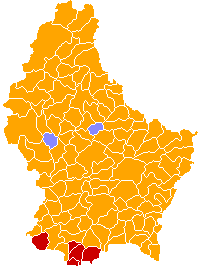
General elections were held in Luxembourg on 13 June 2004, alongside European Parliament elections. The ruling Christian Social People's Party (CSV) of Prime Minister Jean-Claude Juncker won the election, increasing its number of seats to its highest since before 1989 and its share of the vote to levels not seen since the 1959 election.
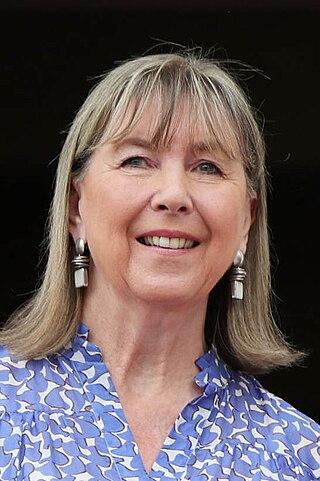
Lydie Polfer is a Luxembourgish politician who has served in a number of capacities, including Deputy Prime Minister, Minister for Foreign Affairs, and Mayor of Luxembourg City, as well as a Member of the European Parliament (MEP) and a member of the Chamber of Deputies. She is a member of the Democratic Party (DP).
Elections in Luxembourg are held to determine the political composition of the representative institutions of the Grand Duchy of Luxembourg. Luxembourg is a liberal representative democracy, with universal suffrage guaranteed under its constitution. Elections are held regularly, and are considered to be fair and free.

The Alternative Democratic Reform Party is a conservative and mildly populist political party in Luxembourg. It has five seats in the sixty-seat Chamber of Deputies, making it the fourth-largest party. In 2024, the party received its first seat in the European Parliament.

South is one of the four multi-member constituencies of the Chamber of Deputies, the national legislature of Luxembourg. The constituency was established in 1919 following the introduction of proportional representation for elections to the Chamber of Deputies. It consists of the cantons of Capellen and Esch-sur-Alzette. The constituency currently elects 23 of the 60 members of the Chamber of Deputies using the open party-list proportional representation electoral system. At the 2023 general election it had 111,884 registered electors.

East is one of the four multi-member constituencies of the Chamber of Deputies, the national legislature of Luxembourg. The constituency was established in 1919 following the introduction of proportional representation for elections to the Chamber of Deputies. It consists of the cantons of Echternach, Grevenmacher and Remich. The constituency currently elects seven of the 60 members of the Chamber of Deputies using the open party-list proportional representation electoral system. At the 2023 general election it had 40,246 registered electors.

North is one of the four multi-member constituencies of the Chamber of Deputies, the national legislature of Luxembourg. The constituency was established in 1919 following the introduction of proportional representation for elections to the Chamber of Deputies. It consists of the cantons of Clervaux, Diekirch, Redange, Vianden and Wiltz. The constituency currently elects nine of the 60 members of the Chamber of Deputies using the open party-list proportional representation electoral system. At the 2023 general election it had 52,922 registered electors.
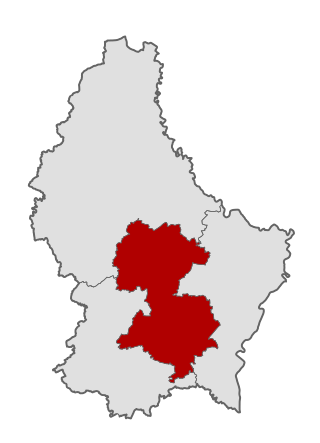
Centre is one of the four multi-member constituencies of the Chamber of Deputies, the national legislature of Luxembourg. The constituency was established in 1919 following the introduction of proportional representation for elections to the Chamber of Deputies. It consists of the cantons of Luxembourg and Mersch. The constituency currently elects 21 of the 60 members of the Chamber of Deputies using the open party-list proportional representation electoral system. At the 2023 general election it had 81,687 registered electors.

General elections were held in Luxembourg on 13 June 1999, alongside European Parliament elections. The Christian Social People's Party remained the largest party, winning 19 of the 60 seats in the Chamber of Deputies. It formed a coalition government with the Democratic Party.

General elections were held in Luxembourg on 12 June 1994, alongside European Parliament elections. The Christian Social People's Party remained the largest party, winning 21 of the 60 seats in the Chamber of Deputies. It continued the coalition government with the Luxembourg Socialist Workers' Party.

Luc Frieden is a Luxembourgish politician and lawyer who serves as the 25th prime minister of Luxembourg since November 2023. A member of the Christian Social People's Party (CSV), he held numerous cabinet positions in the Luxembourgish government between 1998 and 2013, notably serving as the minister for the Treasury and Budget during the transition from the Franc to the Euro and as Minister of Finance during the European debt crisis. Frieden was president of the Luxembourgish Chamber of Commerce and Eurochambres, the business federation of European Chambers of Commerce and Industry.
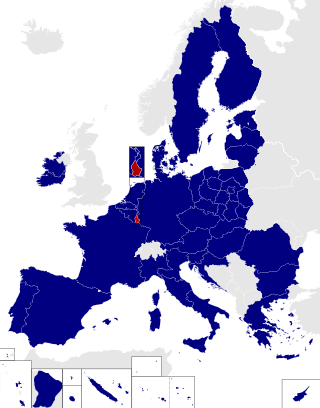
Luxembourg is a European Parliament constituency for elections in the European Union covering the member state of Luxembourg. It is currently represented by six Members of the European Parliament. Luxembourg uses the D'Hondt method.
General elections were held in Luxembourg on 7 June 2009, together with the 2009 election to the European Parliament. All sixty members of the Chamber of Deputies were elected for five years. The polls were topped by the Christian Social People's Party, which built upon its already high number of seats to achieve a commanding victory, with the highest vote share and number of seats of any party since 1954. Incumbent prime minister Jean-Claude Juncker, who was the longest-serving head of government in the European Union, renewed the coalition agreement with Deputy Prime Minister and Luxembourg Socialist Workers' Party leader Jean Asselborn and formed the Juncker-Asselborn Ministry II, which was sworn in on 23 July 2009.

Early general elections were held in Luxembourg on 20 October 2013. The elections were called after Prime Minister Jean-Claude Juncker, at the time the longest-serving head of government in the European Union, announced his resignation over a spy scandal involving the Service de Renseignement de l'État (SREL). The review found Juncker deficient in his control over the service.

Christophe Hansen is a Luxembourgish politician belonging to the Christian Social People's Party (CSV), of which he is Secretary-General.
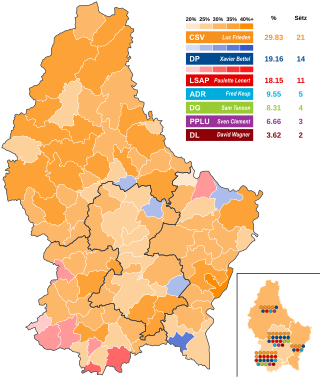
General elections were held in Luxembourg on 8 October 2023 to elect all 60 seats of the Chamber of Deputies.